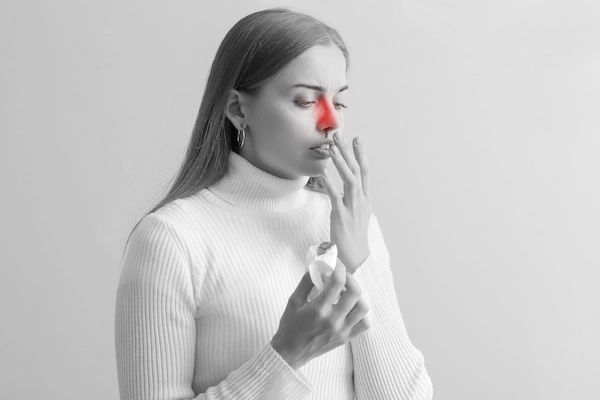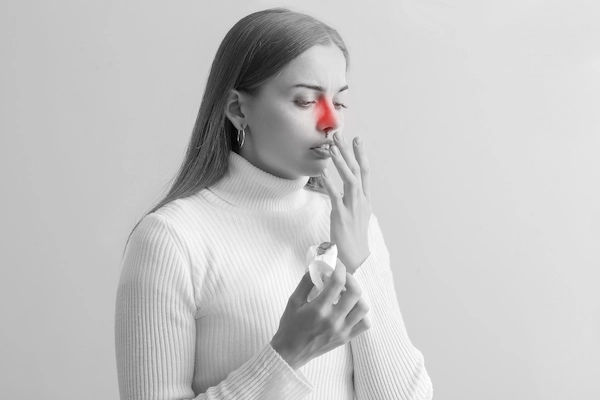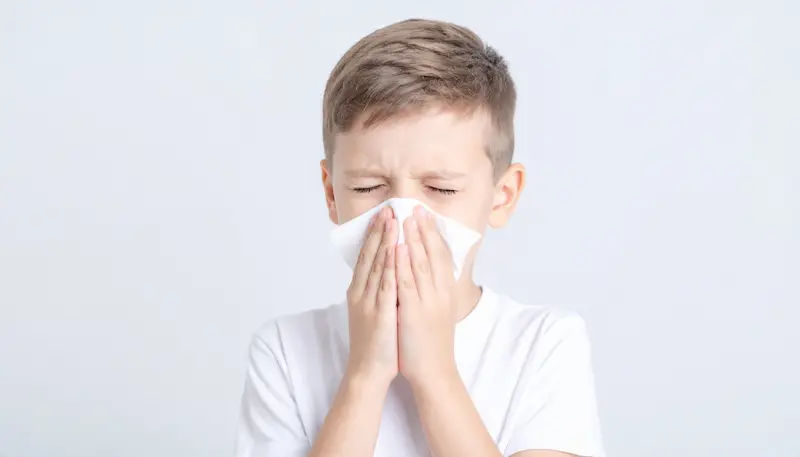Sinusitis: Symptoms, Causes, Treatment, and Prevention
Discover comprehensive insights into sinusitis, including symptoms, causes, treatment options, prevention tips, and when to seek medical care. Learn effective home remedies and expert advice for chronic and acute sinusitis.

Written by Dr. Md Yusuf Shareef
Reviewed by Dr. Rohinipriyanka Pondugula MBBS
Last updated on 13th Jan, 2026

Introduction
A stuffy nose that won’t quit, facial pressure that feels like you’re wearing a tight mask, thick mucus, and a dulled sense of smell—if this sounds familiar, you may be dealing with sinusitis. Sinusitis, also called rhinosinusitis, is inflammation of the air-filled spaces behind your cheeks, forehead, and eyes. It often starts after a cold or seasonal allergies and can range from a short-lived annoyance to a long-term condition that affects sleep, energy, and mood.
In this comprehensive guide, you’ll learn what sinusitis is, how to tell viral from bacterial causes, when antibiotics truly help, and which home remedies provide real relief. We’ll walk through symptoms, diagnosis, treatment options (from saline rinses and nasal sprays to surgery), prevention strategies, and special considerations for children and pregnancy. You’ll also find science-backed tips, practical checklists, and answers to common questions such as “How long does sinusitis last?” and “Is a sinus infection contagious?” If symptoms persist beyond two weeks, consult a doctor online with Apollo 24|7 for further evaluation. Let’s help you breathe easier—starting today.
What Is Sinusitis? A Simple Explanation
Here's a simple explanation:
Sinusitis means inflammation of the lining of your paranasal sinuses—the hollow spaces in the skull that lighten the head, condition the air you breathe, and help with voice resonance. Each sinus connects to the nose through narrow channels. When those channels swell (from a cold, allergens, or irritants), mucus gets trapped. Stagnant mucus becomes thick, pressure builds, bacteria may overgrow, and you feel congested, achy, and drained.
Rhinosinusitis is the more accurate medical term because the nasal passages and sinuses act as a single unit. Most cases begin with a viral upper respiratory infection (a common cold). The lining swells and produces extra mucus, often with postnasal drip. For many people, symptoms peak around days 3–5 and start to improve by day 7–10—this is acute viral rhinosinusitis. A smaller percentage go on to develop acute bacterial sinusitis, typically recognised by symptoms persisting beyond 10 days without improvement, severe symptoms for 3–4 days, or “double-worsening” after initial improvement.Consult Top Specialists
Types of Sinusitis and How Long They Last
Here's what you need to know about types:
Doctors classify sinusitis based on duration and recurrence:
• Acute: Symptoms last less than 4 weeks (most are viral). Bacterial acute sinusitis is less common, often diagnosed using time course and severity criteria.
• Subacute: 4–12 weeks.
• Chronic: 12 weeks or longer, with objective evidence of inflammation on exam or imaging. Chronic rhinosinusitis often includes smell loss and fatigue.
• Recurrent acute: Four or more distinct episodes per year, with symptom-free intervals.
Within chronic sinusitis:
• CRS with nasal polyps (CRSwNP): Soft, noncancerous growths that block airflow and worsen smell loss. Often associated with allergies, asthma, and aspirin-exacerbated respiratory disease.
• CRS without nasal polyps (CRSsNP): Similar symptoms, but no polyps on exam.
Viral cases usually improve within 7–10 days. Bacterial infections may last longer but often still resolve without antibiotics; when needed, antibiotics typically shorten the duration by a day or so on average in adults.
Common Symptoms—and Red Flags You Shouldn’t Ignore
Here's what to watch for:
Typical symptoms of sinusitis include:
• Nasal congestion and obstruction
• Thick nasal discharge (clear, yellow, green) and postnasal drip
• Facial pressure or pain (cheeks, between eyes, forehead), worse on bending
• Reduced sense of smell (anosmia) and taste
• Ear pressure, dental pain (upper teeth), headache, fatigue
Children may show sinusitis in different ways—persistent cough, irritability, halitosis, nasal speech, and prolonged cold symptoms rather than localized facial pain.
Red flags that need urgent care:
• High fever with severe facial pain and swelling around the eyes
• Vision changes, double vision, or eye movement pain
• Significant forehead swelling, severe headache, neck stiffness, confusion
• Symptoms in a person with immune compromise
• Persistent symptoms beyond 10 days with no improvement or “double-worsening” after initial improvement
Sinusitis vs migraine: Migraines can mimic sinus pain, but they often include light/sound sensitivity and nausea without purulent nasal discharge. Up to half of self-diagnosed “sinus headaches” are actually migraines.
If symptoms persist beyond two weeks, consult a doctor online with Apollo 24|7 for further evaluation. If you experience eye swelling, vision changes, or severe headache, book a physical visit to a doctor with Apollo 24|7 or go to urgent care.Consult Top Specialists
What Causes Sinusitis? Infections, Allergies, and More
Here's how sinusitis develops:
Most acute cases start as viral infections from common cold viruses. The majority—about 90–98%—do not require antibiotics because they are viral and improve on their own. Acute bacterial sinusitis can follow, usually due to bacteria that normally live in the nose. Fungal sinusitis is rare and typically occurs in people with immune compromise.
Important risk factors:
• Allergic rhinitis and nonallergic rhinitis
• Structural issues: deviated septum, narrow ostia, nasal polyps, concha bullosa
• Asthma and aspirin-exacerbated respiratory disease
• Irritants: tobacco smoke, indoor and outdoor air pollution, occupational dust/chemicals
• Dental infections or procedures affecting upper teeth
• Immune factors: low immunoglobulins, frequent infections, cystic fibrosis, primary ciliary dyskinesia
How Doctors Diagnose Sinusitis
Here's what happens during diagnosis:
Diagnosis is usually clinical—based on your history and exam. For acute cases:
• Viral: symptoms peak days 3–5 and begin to improve by day 7–10
• Bacterial: persistent symptoms ≥10 days without improvement; severe symptoms (high fever, purulent discharge, facial pain) for ≥3–4 consecutive days; or “double-worsening” after initial improvement
Examination may reveal swollen nasal passages, purulent drainage, or polyps. Imaging (CT) isn’t needed for uncomplicated acute sinusitis. CT or nasal endoscopy is helpful for chronic sinusitis lasting ≥12 weeks, recurrent acute episodes, suspected complications, or surgical planning.
Testing considerations:
• Allergy testing (skin or blood IgE)
• Immune workup for recurrent or severe infections
• Culture-directed therapy via endoscopy in refractory cases
Apollo 24|7 offers convenient home collection for allergy blood tests if recommended. For chronic or recurrent sinusitis, consider an ENT evaluation for nasal endoscopy to clarify diagnosis and guide therapy.
Self-Care That Really Helps
Here's what you can do at home:
• Nasal irrigation: Saline rinses thin mucus and wash out allergens and irritants. Use sterile water and clean your device after each use.
• Intranasal corticosteroids: Reduce inflammation and polyp size; daily use for several weeks is most effective.
• Steam and humidification: Warm showers or humidifiers (40–50% humidity) ease congestion.
• Pain relief: Acetaminophen or ibuprofen; stay hydrated and try warm fluids for postnasal drip.
• Decongestants: Oral or topical decongestants may help short-term; limit topical sprays to 3 days to avoid rebound congestion.
• Antihistamines: For allergy-related sinusitis, non-sedating antihistamines are preferred.
If your condition does not improve after 7–10 days, book a physical visit with Apollo 24|7.
Medical Treatments: Antibiotics, Steroids, and Beyond
Here's what doctors may prescribe:
Antibiotics are needed only for bacterial sinusitis with defined criteria. Amoxicillin-clavulanate is often first-line. Intranasal corticosteroids remain foundational. Short oral steroid courses may be used for severe polyps. Biologics, such as dupilumab, reduce polyp size in select cases. Endoscopic sinus surgery widens drainage pathways for refractory cases, with recovery typically 1–2 weeks for light activities.
If symptoms persist beyond two weeks, consult a doctor online with Apollo 24|7.
Prevention: Small Daily Habits, Big Relief
Here's how to prevent sinusitis:
• Control allergens with HEPA filters and regular cleaning
• Maintain air quality, avoid smoke, and keep indoor humidity at 40–50%
• Hydration and nasal care
• Vaccines and illness prevention
• Prompt dental care
• Travel and activity tips, such as saline use before flights or swimming
Special Situations: Kids, Pregnancy, and Comorbidities
Here's what to consider:
Children: Persistent nasal discharge, cough, halitosis, irritability; allergy evaluation if recurrent
Pregnancy: Prioritise non-drug measures; consult obstetrician for corticosteroid use
Comorbidities: Asthma, GERD, immune deficiencies, cystic fibrosis—tailored care required
Myths vs Facts About Sinusitis
Here's the truth:
• Green mucus ≠ bacterial infection
• Antibiotics don’t cure viral sinusitis
• Decongestant sprays should not be used indefinitely
• Surgery improves drainage but does not cure chronic inflammation
• Many “sinus headaches” are migraines
Living With Chronic Sinusitis: A Practical Plan
Here's a practical approach:
• Morning: Saline irrigation + intranasal corticosteroid; antihistamine if allergy-driven
• Midday: Hydration check, short walk
• Evening: Steam or saline mist, review symptom tracker
Track triggers, flare-ups, and maintain consistent nasal care.
If your chronic regimen isn’t effective, consult a doctor online with Apollo 24|7 or schedule an ENT review.
When to See a Doctor—and What to Expect
Here's what you need to know:
Seek medical advice if symptoms persist beyond 10 days, are severe, show double-worsening, or red flags appear. Bring a symptom timeline, note home treatments, exposures, and photos of nasal discharge if helpful. Telehealth is useful for initial evaluation; in-person visits are preferred for recurrent, chronic, or complicated cases.Consult Top Specialists
Conclusion
Sinusitis can sap your energy, disrupt sleep, and dull the simple joy of smelling morning coffee. The good news is that most cases are short-lived and respond well to supportive care—saline irrigation, intranasal steroids, hydration, and rest. Understanding the difference between viral and bacterial sinusitis helps you avoid unnecessary antibiotics while seeking timely treatment when needed. For chronic sinusitis, think long game: consistent nasal care, allergy control, and attention to indoor air quality offer steady relief, while advanced options—including biologics and endoscopic sinus surgery—can help when inflammation or anatomy keep getting in the way. Your path to easier breathing starts with small, daily steps. Track symptoms, note triggers, and build a personalised plan you can actually follow. If your symptoms persist beyond two weeks, or you experience severe pain, high fever, eye swelling, or vision changes, consult a doctor online with Apollo 24|7 for further evaluation or book an in-person visit for nasal endoscopy and tailored treatment. With the right strategy—grounded in evidence and tuned to your life—sinusitis doesn’t have to run the show.
Consult Top Specialists

Dr. S. Thirunavukkarasu
Ent Specialist
21 Years • Pediatric ENT & Airway surgery & Certificate of training in Airway surgeries at University hospital CHUV, Lausanne, Switzerland.
Chennai
Apollo Children Hospitals Greams Road, Chennai

Dr. Urvashi Singh
Ent Specialist
10 Years • MBBS, MS (ENT)
Chennai
Apollo Hospitals Greams Road, Chennai
(25+ Patients)

Dr Vasudha Singh
Ent Specialist
6 Years • MBBS, DNB (ENT)
Lucknow
Apollomedics Super Speciality Hospital, Lucknow

Dr. Balaji R
Ent Specialist
17 Years • MBBS, MS (ENT)
Chennai
Apollo Hospitals Greams Road, Chennai
(125+ Patients)

Dr. Madhav Koka
Ent Specialist
4 Years • (MBBS) , (DNB) Otorhinolaryngology , MRCS (ENT) , (DOHNS) Head and Neck Surgery , Royal college of Surgeons Senior clinical Laryngology fellowship
Hyderabad
Apollo Hospitals Jubilee Hills, Hyderabad
(25+ Patients)
Consult Top Specialists

Dr. S. Thirunavukkarasu
Ent Specialist
21 Years • Pediatric ENT & Airway surgery & Certificate of training in Airway surgeries at University hospital CHUV, Lausanne, Switzerland.
Chennai
Apollo Children Hospitals Greams Road, Chennai

Dr. Urvashi Singh
Ent Specialist
10 Years • MBBS, MS (ENT)
Chennai
Apollo Hospitals Greams Road, Chennai
(25+ Patients)

Dr Vasudha Singh
Ent Specialist
6 Years • MBBS, DNB (ENT)
Lucknow
Apollomedics Super Speciality Hospital, Lucknow

Dr. Balaji R
Ent Specialist
17 Years • MBBS, MS (ENT)
Chennai
Apollo Hospitals Greams Road, Chennai
(125+ Patients)

Dr. Madhav Koka
Ent Specialist
4 Years • (MBBS) , (DNB) Otorhinolaryngology , MRCS (ENT) , (DOHNS) Head and Neck Surgery , Royal college of Surgeons Senior clinical Laryngology fellowship
Hyderabad
Apollo Hospitals Jubilee Hills, Hyderabad
(25+ Patients)
Consult Top Specialists

Dr. S. Thirunavukkarasu
Ent Specialist
21 Years • Pediatric ENT & Airway surgery & Certificate of training in Airway surgeries at University hospital CHUV, Lausanne, Switzerland.
Chennai
Apollo Children Hospitals Greams Road, Chennai

Dr. Urvashi Singh
Ent Specialist
10 Years • MBBS, MS (ENT)
Chennai
Apollo Hospitals Greams Road, Chennai
(25+ Patients)

Dr Vasudha Singh
Ent Specialist
6 Years • MBBS, DNB (ENT)
Lucknow
Apollomedics Super Speciality Hospital, Lucknow

Dr. Balaji R
Ent Specialist
17 Years • MBBS, MS (ENT)
Chennai
Apollo Hospitals Greams Road, Chennai
(125+ Patients)

Dr. Madhav Koka
Ent Specialist
4 Years • (MBBS) , (DNB) Otorhinolaryngology , MRCS (ENT) , (DOHNS) Head and Neck Surgery , Royal college of Surgeons Senior clinical Laryngology fellowship
Hyderabad
Apollo Hospitals Jubilee Hills, Hyderabad
(25+ Patients)
More articles from Sinusitis
Frequently Asked Questions
1) How long does sinusitis last?
Viral sinusitis often improves within 7–10 days. Persistent symptoms beyond 10 days, severe symptoms for 3–4 days, or double-worsening may indicate acute bacterial sinusitis and warrant medical advice.
2) Is a sinus infection contagious?
The viruses that trigger sinusitis are contagious, but sinusitis itself isn’t. Good hand hygiene and staying home when ill reduce spread.
3) What’s the best nasal spray for sinusitis?
For many, intranasal corticosteroids are the best daily option to reduce inflammation, especially in chronic sinusitis. Saline sprays are helpful adjuncts. Decongestant sprays should be limited to 3 days to prevent rebound.
4) When should I take antibiotics for sinus infection?
Consider antibiotics when symptoms persist beyond 10 days without improvement, are severe for ≥3–4 days (high fever, facial pain, purulent discharge), or worsen after initial improvement. Discuss watchful waiting vs immediate antibiotics with your clinician.
5) Can deviated septum cause sinusitis?
A deviated septum can narrow drainage pathways, increasing the risk of blockage and infections. If medical therapy isn’t enough, surgery to correct anatomy may help.




